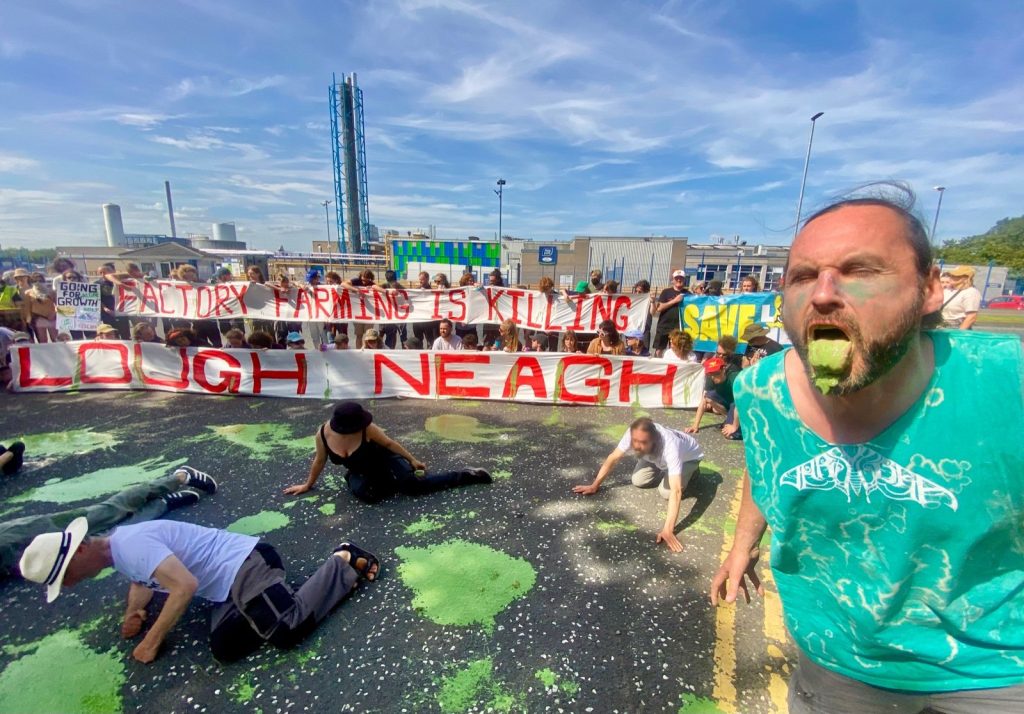
Climate Camp activists draw attention to intensive animal agriculture polluting waterways and causing climate breakdown
More than 100 activists from across Ireland joined the Save Lough Neagh campaign today (Sunday, 11th August) in a dramatic action at a Moy Park chicken factory in Craigavon, Co Armagh, highlighting the major role of factory farming in “killing Lough Neagh” and accelerating climate breakdown.
In a theatrical set-piece at the factory gates, the activists appeared to vomit green sludge, highlighting the health hazards of blue-green algae and the ecological devastation of Ireland’s lakes and rivers.
Moy Park, recently in the news for hundreds of breaches of environmental laws, has factories within the Lough Neagh catchment area in Dungannon and Ballymena, as well as Craigavon.
Moy Park slaughters 6 million birds a week across its European factories.
Moy Park is owned by Brazilian agri-food giant JBS, the world’s largest animal protein company. Large-scale deforestation and human rights abuses linked to JBS have been widely documented by Greenpeace, Global Witness, Amnesty International and others.
This includes forced labour and land grabbing of Indigenous lands. Between 2008 and 2020 JBS’s total deforestation footprint was estimated at 200,000 hectares in its direct supply chain and 1.5 million hectares in its indirect supply chain.
“While infamous for their role in the destruction of the Amazon, JBS is less well known for its part in the ecological collapse of Ireland’s largest lake,” said Dr Laura Kehoe, an environmental scientist and a member of Slí Eile, the main organising group behind Climate Camp.
The JBS owned chicken factory farm known as Moy Park was spotlighted recently in a BBC investigation which linked it to hundreds of environmental breaches.
Although NI Water has responsibility for treating effluent from these factories to minimise contamination to waterways, it admitted to the BBC that raw sewage and untreated trade effluent spill from its facilities on 25,000 occasions each year (68 spills per day).
“If something happens 25,000 times a year it can’t be called a ‘spill’, it’s extreme neglect resulting in ecocide,” continued Dr Kehoe.
Instead of taking immediate action to contain the spills, Agriculture and Environment Minister Andrew Muir said: “I’ll be writing to Moy Park seeking an explanation in terms of the situation you outlined.”
Pádraig Cairns of Save Lough Neagh said:
“Moy Park is the quintessential example of how industrial agriculture is killing Lough Neagh. Neoliberal capitalism has allowed this multinational corporation to enrich itself and its executives, sending profits abroad and leaving in its wake a ravaged ecosystem.
“Moy Park is the largest company in the north of Ireland, with a turnover of £1.88 billion last year. The mistreatment of both animals and factory workers should be condemned by anyone with a conscience, and what do the public have to show for all this suffering? A dead Lough.”
Animal agriculture is Ireland’s most dangerous occupation. While farms account for just 5% of Irish workplaces, the sector accounts for almost half of workplace deaths.
The action at the Moy Park factory took place on the final day of Climate Camp, a five-day “festival of resistance” on the shore of Lough Neagh at Ardboe, Co Tyrone, at which hundreds of climate activists and community campaigners gathered, invited by local community groups Save Lough Neagh and Save our Sperrins.
Climate Camp took place in the wake of news that blue-green algae is back at the devastating levels seen in 2023 in Lough Neagh. The ecological catastrophe at the Lough, which provides more than 40% of the North’s drinking water, was caused by a combination of intensive animal agriculture – driven by the Stormont government’s ‘Going for Growth’ strategy – raw sewage, industrial sand dredging and climate change. Co Antrim, which has a human population of 650,000, has 20 million farm animals living in cages.
Pádraig Cairns of Save Lough Neagh continued:
“Government policy has incentivised this exploitative agricultural model for decades, through initiatives like Going For Growth, so it is concerning to campaigners that Andrew Muir’s recent 37-point action plan does not seek to overhaul the way we regulate these big agri-businesses. Corporations like Moy Park that treat our environment and our sacred spaces like a private sewer need to be held accountable, and campaigners will work tirelessly to ensure that our government doesn’t shirk its duty in doing so.”
Barry Ferguson, a Co Down farmer/grower and organiser for the Landworkers’ Alliance, one of many groups that took part in this year’s Climate Camp, said: “Many farmers in the North are locked into a system of farming livestock and feed for livestock that gives them very low incomes, causes climate breakdown, pollutes our waterways and dominates land use for export commodity food production, which, in environmental terms, is one of the least efficient ways to produce human food.”
“Better would be more focus on production of vegetables and meat for local consumption here, and using the land more efficiently for carbon storage and capture and enhancing biodiversity. We need subsidies that allow farmers to make the transition to the type of farming that gives them a decent living, produces affordable, nutritious food for local supply and also protects rather than harms land, water, biodiversity and the climate.”
Dr Laura Kehoe concluded:
“Industrial animal agriculture is not only the main cause of the catastrophe at Lough Neagh, but also the number one cause of greenhouse gas emissions, water pollution and biodiversity collapse across Ireland. We simply cannot continue with the extreme harm caused by corporations maximising their profit margins at the literal cost of the Earth.”